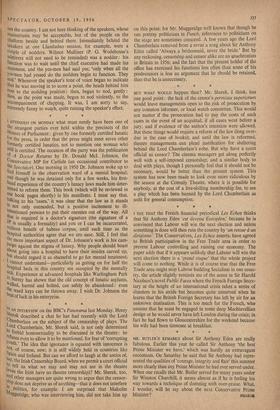BUT WHAT WOULD happen then? Mr. Sherek, I think, has
one good point : the lack of the censor's permissu superiarunz would leave managements open to the,risk of prosecution by any common informer, or local watch committee. This would not matter if the prosecution had to pay the costs of such cases in the event of an acquittal; if all cases went before a jury; and if evidence of the author's intention were allowed. But these things would require a reform of the law (long over- due in the case of books); and until the law is reformed, theatre managements can plead justification for sheltering behind the Lord Chamberlain's robe. But why have a court official as censor? The cinema managers get along perfectly well with a self-imposed censorship; and a similar body to deal with plays, though I personally feel that it should not be necessary, would be better than the present system. This system has now been made to look even more ridiculous by the season at the Comedy Theatre, where it is possible for anybody, at the cost of a five-shilling membership fee, to see a play which has been banned by the Lord Chamberlain as unfit for general consumption.


































 Previous page
Previous page